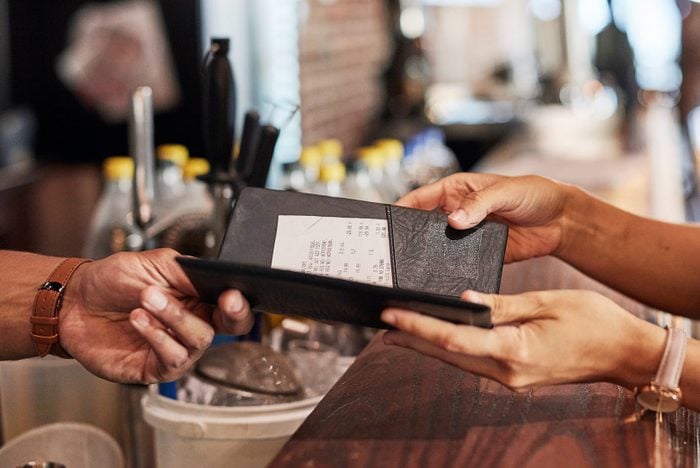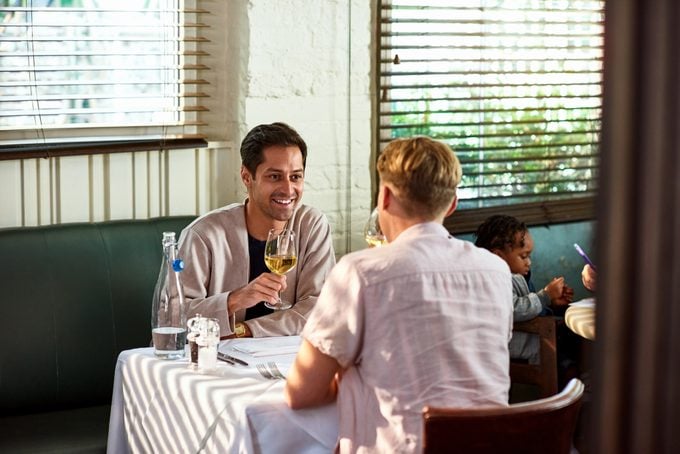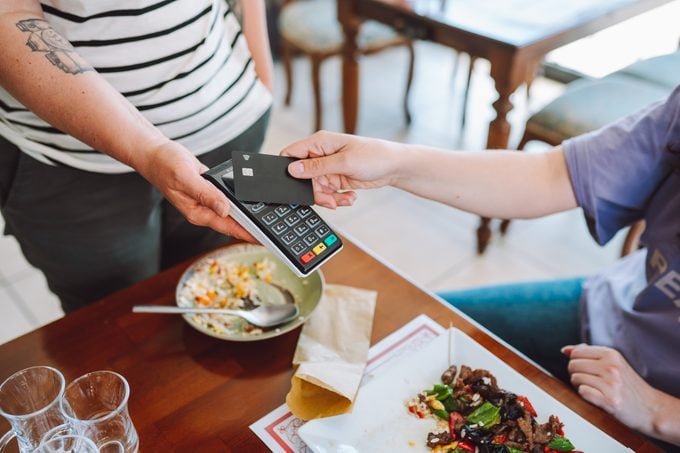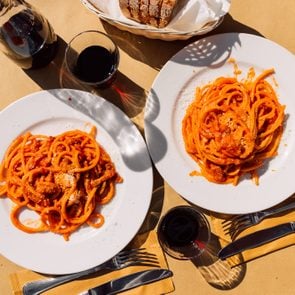Who Picks Up the Tab? Here’s How to Handle the Restaurant Bill in 11 Situations
Updated: Jan. 25, 2024

We're taking the guesswork and awkwardness out of paying the restaurant bill with this tried-and-true advice from etiquette experts
Whether you’re out to dinner with a large group of friends, out-of-town clients or a first date, determining who is going to pick up the tab—and how to broach the subject in the first place—can create a sticky situation. But if you know proper paying-the-restaurant-bill etiquette, it doesn’t have to be so awkward.
To get the skinny on the dining etiquette and tipping etiquette you should follow in these situations, we spoke to experienced etiquette experts. Keep reading to discover how to approach paying the bill in a manner that’s civil, polite and respectful to everyone involved, and to make sure you aren’t engaging in a polite habit restaurant staffers dislike.
Get Reader’s Digest’s Read Up newsletter for more etiquette tips, humor, cleaning, travel, tech and fun facts all week long.
Paying a restaurant bill: Etiquette tips
There are a surprising number of situations you may find yourself in when you’re out at a restaurant, bar or coffee shop, and all require a certain amount of finesse when it comes to picking up the tab. By following proper paying-a-restaurant-bill etiquette, you can avoid being annoying in the following situations.
Out with friends
Meeting a few friends for a meal is likely a splitting-the-bill situation, says Lisa Mirza Grotts, a certified etiquette expert who’s been offering tips on etiquette rules for the past 23 years. “If there is no host, then it is assumed that everyone will split the bill unless one person offers to host,” she adds.
Say you have a weekly standing lunch date with a few girlfriends. Instead of splitting the bill every time, you could rotate who the “host” is and who picks up the tab.
A birthday meal
“The birthday girl or boy never pays, unless ahead of time they offered to host a party for themselves,” Grotts says, adding that it’s best to make a plan with other partygoers—before the big event—regarding who is going to cover the birthday person’s meal or drinks, and how.
Since this may be a situation in which everyone is paying for themselves except for one person, it’s likely easiest to have one friend cover the guest of honor and then have the others pay them back later.
Out with your parents
No two families are alike, which is why one household may make proper table manners a priority, while another may turn dinner into a free-for-all. Likewise, when paying a restaurant bill, etiquette that works for your family dynamics may not work for another. Tricky as the situation may be, the key is to figure out what works for you and your parents.
In my family, if it’s a pre-planned dinner, my parents usually pay, though they appreciate that I still pull my credit card out every time. “My dad does the same,” says Grotts. “But we have a rule that when he comes to our house, we pay, and when we go to his house, he pays.” Once you’ve established these rules in your family, they’re easy to stick to.
Meeting for an interview
“If you are conducting an interview, and you extended the invitation, you are responsible for picking up the tab, regardless of what they order,” says Diane Gottsman, a national etiquette expert and owner of the Protocol School of Texas.
As an interviewee hoping to put your best foot forward, this is one less thing you need to worry about. You can save your strategizing for what to say in an interview.
A meal with colleagues

“If you are out with peers at a friendly lunch, everyone should pay for their own meal,” Gottsman says. “Likewise, if you are at a restaurant with equal-level colleagues and you are all ordering comparably, there is nothing wrong with splitting the tab.” Things change if one person starts to order high-priced cocktails or an expensive dish like a plate of oysters.
If someone does this, they shouldn’t expect their colleagues to cover it, explains Gottsman—with equal-level colleagues or peers who are all pulling in roughly the same salary, that’s unfair.
A meeting or reunion
A friends or family reunion or a book club meeting may be handled differently than a casual meal out with friends, primarily because there will likely be a designated host or organizer. When it comes to paying the restaurant bill, etiquette typically dictates that the host pick up the tab. But Grotts says that hosts don’t necessarily need to pay, provided they communicate the situation ahead of time. “It’s important for the host or organizer to make this clear when the invitation is being sent out,” she explains.
Entertaining clients
This one is pretty straightforward. “The overall goal of a client meal is to build a relationship with the client,” says Gottsman. “If you extend the invitation, you pay, and you tip.”
But if the client protests, don’t put up too much of a fight—this is a polite habit most people dislike. “If the client insists on paying because they extended the invitation, you would not argue … simply say thank you,” Gottsman adds.
After-work drinks
When you’re at a bar and people are ordering drinks and food as they want them, it can feel like the Wild West. Should you wrangle the group into splitting the check or play lone cowboy and start your own tab?
“You can either start your own tab or know that you may be splitting the bill and the orders may be imbalanced,” says Gottsman. “It’s up to your personal comfort level as to whether or not you determine to ask for a separate check.”
If you’re not drinking alcohol or have dinner plans and you’re only staying for one sip, no one will bat an eye if you order separately or ask for your own check. But if you arrive and leave with a big group and you’re all drinking and sharing appetizers, splitting the bill or paying someone back with Venmo or Zelle may be the way to go. Just don’t ask the bartender to itemize a split bill—that’s one habit bartenders really don’t like.
On a first date

“Whoever initiated the event should pay,” says Grotts. “So if a woman has asked a man out, she should pay, and vice versa.” This rule even covers online or app-based situations where two people may be chatting for a while before meeting in person. After all, someone has to propose the idea to get together.
On later dates
A second date is a good chance for the invited party on the first date to reciprocate, Grotts says. From there, it’s up to the couple to determine how they want to handle paying going forward.
One smart strategy: If you suggest a particularly pricey restaurant for a date early on in a relationship—especially before you know much about the other person’s finances—be prepared to cover the tab. You don’t want to put them in an uncomfortable situation where they have to politely decline an invitation because you really wanted to eat lobster.
At a coffee shop or fast-casual restaurant
These days, plenty of people meet for romantic dates or friend meet-ups at coffee shops or fast-casual restaurants that require you to order and pay at the counter, which can create a bit of a gray area. “You can still have a date at a coffee shop and pay, even though the price might be less,” notes Grotts. “But if you’re not sure of how to handle this, one way to deal with it is to get to the coffee shop early and order your drink and be seated, which nonverbally says that the other person should also get theirs.”
On the flip side, if you want to pay, ask the other person what they would like to eat or drink while you are at the table, which implies you will then go up to the counter to place and pay for both orders. And while you’re ordering, be sure to avoid those so-called polite habits baristas really don’t like.
Paying a restaurant bill: Etiquette FAQs

Read on for answers to some of your more general questions about paying-a-restaurant-bill etiquette.
How do you politely ask who’s paying for dinner?
Everyone is thinking about it as soon as the dessert is cleared, so you might as well come out and say it. A simple “How are we handling the bill?” should suffice. And no, you shouldn’t make an Irish exit immediately after this conversation.
What is the etiquette for getting the bill?
You should ask for the bill at the end of a meal in the same manner as you’ve handled all your other interactions with your server: with patience and respect. You wouldn’t yell your order across a crowded restaurant, and that’s not the best way to ask for the check either.
That said, if you’re planning to pay for the whole group and want to skip this step entirely, you can. “Get to the restaurant early and give your credit card to the maître d’ ahead of time with instructions of how much to leave for a tip,” suggests Grotts. “That way, there will be no argument when the bill comes.”
Is it rude to ask for separate checks at a restaurant?
Never! But there is a polite way to do it. “When it comes to splitting the bill, there’s nothing wrong with letting the server know at the beginning of the meal that you would like separate checks,” Gottsman says. This way, the server can enter the items into the system accordingly, which will make it easier to produce separate checks at the end of the meal. If you wait until the meal is over to mention separate checks, the process is much more complicated and time-consuming for your server.
How do you split the bill in dining etiquette?
If you’re planning to go Dutch on the bill, these general rules are helpful to follow.
When someone isn’t drinking
If the majority of your party is drinking alcohol and only one or two people are not, they shouldn’t be expected to pay an equal share to cover their friends’ cocktails, says Gottsman.
When someone’s meal is much cheaper than the others
The advice for this one is a little foggy, and it comes down to why you’re ordering a cheaper meal. If you just really feel like a salad though everyone else is ordering a steak dinner, you may need to accept that you’re splitting the bill evenly. But if your reasons are financial, it may be worth mentioning to the server and to the rest of your party at the start of the meal that you are trying to save money so you’re going to get your own bill.
How to tip on a split bill
Tipping etiquette doesn’t offer hard-and-fast rules—except this one: You need to tip on your portion of the restaurant bill.
“When you split a bill, everyone tips on their own portion of the bill, and different people may tip differently,” says Gottsman. “You can certainly suggest that you all tip a certain amount or ask what others are tipping, but you want to be fair and make sure you’re tipping [at least] 20%.”
How to split the bill
Asking for individual checks is fine, as long as you tell your server at the start of the meal. Ditto for splitting the bill just two or even three ways.
But avoid overcomplicating the matter. Let’s say you’re dining with seven people, five of whom want individual checks and two who want just one check. That’s going to get a lot more complicated for your server. Try to keep it as simple as possible.
Should a man always pay for dinner?
Not anymore. Free yourself from following outdated etiquette rules on dates. These days, the person who asks the other one out should be the one to pay, says Grotts.
About the experts
- Lisa Mirza Grotts is a certified etiquette professional and public speaker with 23 years of experience helping people navigate social situations with confidence and poise. She is a past member of the International Society of Protocol and Etiquette Professionals and the author of A Traveler’s Passport to Etiquette.
- Diane Gottsman is an internationally renowned etiquette expert, speaker and owner of the Protocol School of Texas, a company that specializes in professional etiquette training. She has a master’s degree in human behavior and is the author of Modern Etiquette for a Better Life.



